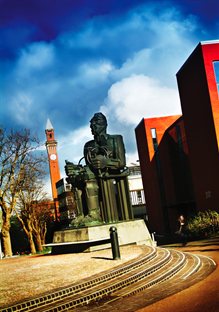- PhD Physical Chemistry
- Managing Director, R&D Consultancy
Duration – 6:54
I’m Barry Hill; I graduated with a PhD in Physical Chemistry in 1983. What I do currently is that I run what is best described as an R&D Consultancy, on my own account. I have been effectively working for myself for more than 20 years, mostly in software, but also in electronics and sensor development and related fields.
Q1 – How did your time at the University shape and influence you?
A1 – Well of course it’s a long time ago, which of course is the thing. It was certainly an enjoyable time of my life. I made some lifelong friends, shall we say. It was certainly interesting, and the course has actually acted as a very good springboard on to my future career, and to my life. I met my wife when I was working as a PhD student, and all that sort of thing. It also gave me a chance to live in a city, which was something new as I was always based in rural areas, and now I have returned to live in a rural area, so it was the time that I lived in an urban environment and everything that came with it. So it was quite interesting, and of course it was the 70’s and 80’s around Birmingham at that time… it was, to say the least interesting, in many respects!
Q2 – Why do a PhD at Birmingham?
A2 – It felt like a natural progression, I suppose one must confess that it seems an easy choice in many respects. As I remember, I was rather fortunate at the time to be offered a research assistantship, which was a good as getting a job in terms of pay and everything like that, so it was a no brainer really. The subject matter seemed quite interesting and it appealed to me, so that was it really.
Q3 – How has having a PhD helped your career?
A3 – In the career I chose it’s…as I’m sure that others have probably explained, it’s that career paths are never straight and they seldom follow exactly from your PhD subject. The subject I worked on was using light scattering to try and understand the physical chemistry of low density lipoproteins and how they related to the forming of blood clots in arteries. Initially that’s how it was; it didn’t end up like that, as things don’t work sometimes for all sorts of reasons. So my initial career path was actually looking for a job…when you finish you have to get a job somehow, and the jobs for physical chemists, you know you can probably count them on less than the fingers on one hand in any one year. And so like many physical chemists, I moved into software development. Because the development of software goes hand in hand with physical chemistry, because you have to do modelling, you have to do control, and those sort of things, so I moved into software development for a few years. The company that supplied the equipment I was using during my PhD was looking for staff, so I applied to them for a job and got one, although not actually working on the field that I was originally working on for the PhD, but on a related [field]. And I’ve now been working fairly closely in that industry in various guises for over 20 years, 25 years maybe. So, in a sense the actual PhD was wholly relevant, as the nature of it worked out. It could have gone an entirely different way. I could have remained working for a software house as a code jockey or something like that, and now be a manager somewhere in the south of England, but as it was I ended up working in something that was the same, but different from the PhD.
Q4 – What would you say to a student who is thinking of doing a PhD?
A4 – Erm, do it! whether or not you do a PhD now or later. The advantage of course of doing it later is that you may be more worldly. The advantage of doing it now is of course you usually have fewer encumbrances, or you haven’t had the chance to acquire the encumbrances. Whereas of course if you do it later then the opportunities could be fewer, or you may have to put it off until much later in life, but just do it when you can, it’s certainly worth the effort.
Of course it’s one thing to be a technical expert in your field, or applying it out in the real world, or in business, or that sort of thing, but if you really want to do well or to even just work for yourself, one of the most important things is to learn good business skills. Such as; how to write a business plan, how to actually be able to present your business ideas to others, to people who will have money and people who have money that you want! So that you can bring your ideas to fruition, and you can do well. If you don’t understand business, just basic business ides, how to present your idea, your concepts, they’ll fail. If you do then money will pour in by the barrel load with absolute ease, and so that’s why you should give yourself a good broad business education.
